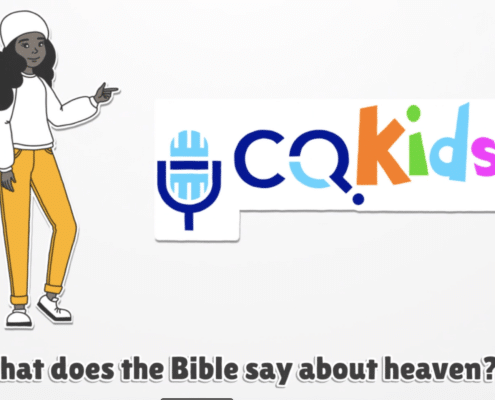VIDEO: How to Study the Bible and Have it Make Sense
Do you want to study the Bible but have a difficult time making sense of it? Learn different techniques you can use right away to go deeper into your studies.
Related Videos

VIDEO: What does the Bible say about heaven?

Does God’s Holy Spirit Speak to Us?

VIDEO: Does God’s Holy Spirit Speak to Us?

What Is the New Creation?

VIDEO: What Is the New Creation?

VIDEO: What happened at Pentecost?

Is My Christian Judgment Tainted by Bias? (Part II)

VIDEO: Is My Christian Judgment Tainted by Bias? (Part II)

Is My Christian Judgment Tainted by Bias? (Part I)

VIDEO: Is My Christian Judgment Tainted by Bias? (Part I)

How Do We Know Jesus Is the Promised Messiah? (Part II)

VIDEO: How Do We Know Jesus Is the Promised Messiah? (Part II)
Ep.946: How Can I Get the Holy Spirit?
What the holy spirit is, what it does, who gets it and why
If you do not have a password, please subscribe to our FREE Premium Content for the Full Edition version of CQ Rewind. The welcome message will contain your password, and a reminder will be sent each week when the CQ Rewind is available online for you to read, print, or download.
CHAPTERS
Theme Scripture: Ephesians 5:18
How would you like access to power? This power can change your life, give you things, protect you and even heal diseases! This power is from a source that is unlimited, a source that is generous and a source that truly has your best interest in mind. Sound intriguing? For many Christians, this power is the holy spirit and these enticing claims come across as very real. But are they real? Is this what the holy spirit is really about or does the truth of the matter look entirely different? Who “gets” the holy spirit? When you get it, what does that mean? What does it change? Can we, should we be trying to have the holy spirit working in our lives?
YES!
If you consider yourself a real and dedicated Christian, the obvious answer to that last question is "yes." Yes, you should be trying to have the holy spirit working in your life. The follow up to this question is where we begin to find trouble, because that is where we as Christians diverge in our understanding of the matter. Defining what the holy spirit is, what functions it performs and how the holy spirit actually changes one’s life is daunting.
When does God's spirit first appear in the Bible?
To begin to deal with this, we decided to look at when the it was first introduced in the Bible. The result of this search is instantaneous because the second verse of the very first book of the Bible reveals that “God’s spirit moved upon the face of the waters.” There it is, right at the beginning of all earthly beginnings - God’s spirit exerting the power of change and creation.
The most strict and literal sense of the word for “spirit” in Genesis is the Hebrew word for "wind" or "breath," which gives us a picture of an unseen force or power. This thought is actually born out in the New Testament as well. The two Greek words that make up the phrase “holy spirit” can be literally translated “sacred” and “current of air or breath” so we might take this as a description of “God’s sacred and unseen power” used to work with us in our lives.
When you think about that, it is pretty astounding. God’s power at work in my life! The same power that drove creation wrote prophecy and worked miracles. How does this even happen? The answer to that question is equally as astounding. When we look at the way God’s spirit - His sacred and unseen power - worked in the Old Testament with humanity, we can see a clear and distinct mode of operation. In the New Testament, there is an obvious change in not only method but the operation as well.
Find out what the differences are between the Old and New Testament applications of God’s sacred and unseen power. We also explore the specifics of what the holy spirit does and does NOT do for us here and now. Listen to our November 28, 2016 podcast, “How Can I Get the Holy Spirit?” and begin to put the pieces of God’s power applied in their proper places. If God’s power is going to work in your life, don’t you think you should know what to expect?
Related Episodes

How Can We Become Influencers? (Part I)

VIDEO: How Can We Become Influencers? (Part I)

VIDEO: What does the Bible say about heaven?

Does God’s Holy Spirit Speak to Us?

VIDEO: Does God’s Holy Spirit Speak to Us?

What Is the New Creation?

VIDEO: What Is the New Creation?

VIDEO: What happened at Pentecost?

VIDEO: Why didn’t some people like Jesus?

Is My Christian Judgment Tainted by Bias? (Part II)

VIDEO: Is My Christian Judgment Tainted by Bias? (Part II)

Is My Christian Judgment Tainted by Bias? (Part I)
Ep.945: Is Gratitude Your Attitude?
Learning to have gratitude through biblical examples
If you do not have a password, please subscribe to our FREE Premium Content for the Full Edition version of CQ Rewind. The welcome message will contain your password, and a reminder will be sent each week when the CQ Rewind is available online for you to read, print, or download.
CHAPTERS
Theme Scripture: Hebrews 13:15
Here’s a question...what do the 4th of July and Thanksgiving have in common? The most obvious answer is these two celebrations are uniquely American in that their very founding was undeniably linked to the founding of the United States. The less obvious answer is that these two holidays were also founded in humble recognition of God Almighty. Just read the first and last parts of the Declaration of Independence and the first declarations for Thanksgiving and you will see that God was first and foremost. Here we are about 240 years later and God is no longer first and he certainly is no longer "for most." So, as we approach the Thanksgiving holiday this Thursday what can we do to relight our own fire of gratitude towards God and towards one another? Let’s start by talking about it!
Think about back when you were a kid. If you were fortunate to have parents (as I did) who believed in manners and gratitude you probably recall the humbling lessons of constantly being reminded to say thank you. Remember? Someone would do something for you and your mom or dad would say, “What do you say?” and you would dutifully (and sometimes with a twinge of embarrassment) say thank you. Gratitude really is a simple lesson but is often a hard to implement response.
As with anything that is hard to do, it is always a good idea to know why you should do it. If you just take a small peek at the science of gratitude, what you will find is that people who make gratitude an intentional part of their lives are happier, they are healthier, they have better relationships and they even tend to live longer. Thank you, Mom and Dad, for getting me started on the road to gratitude!
Okay, so we now know why we should have gratitude. Knowing why is a great motivator and brings us to the next logical question – how. How do we not just have gratitude, but how can we learn to live a gratitude-based life? We can start by looking at some practical examples of gratitude in action. We can find these examples in the world around us (granted that is probably not as easy as it once was) and we can find these examples written for us in the Bible. The difference between these two sources may not be obvious until stated. Current day gratitude stories are primarily focused on being thankful to and for each other, whereas biblical gratitude lessons are primarily focused on being thankful to God.
Both types of gratitude focus are necessary, and both sadly are in critically short supply today. Consider this; our deepest gratitude would naturally be towards those whom we most trust. If we don’t display an attitude of gratitude to even these individuals then we have actually crossed over into living an attitude of entitlement. This is not merely worrisome, it is tragic!
Please look into our November 21, 2016 podcast, “Is Gratitude Your Attitude?” and follow the many examples of gratitude we talk about, gather up our many observations regarding how to make gratitude work every day and open the door to a fuller, happier and more contented life. There is so much to be thankful for!
Related Episodes

How Can We Become Influencers? (Part I)

VIDEO: How Can We Become Influencers? (Part I)

VIDEO: What does the Bible say about heaven?

Does God’s Holy Spirit Speak to Us?

VIDEO: Does God’s Holy Spirit Speak to Us?

What Is the New Creation?

VIDEO: What Is the New Creation?

VIDEO: What happened at Pentecost?

VIDEO: Why didn’t some people like Jesus?

Is My Christian Judgment Tainted by Bias? (Part II)

VIDEO: Is My Christian Judgment Tainted by Bias? (Part II)

Is My Christian Judgment Tainted by Bias? (Part I)
Ep.944: Once Saved, Are You Set for Life?
Who gets "saved" and what does "saved" really mean?
If you do not have a password, please subscribe to our FREE Premium Content for the Full Edition version of CQ Rewind. The welcome message will contain your password, and a reminder will be sent each week when the CQ Rewind is available online for you to read, print, or download.
CHAPTERS
Theme Scripture: Romans 5:17
A goose that lays golden eggs. King Midas and the ability to turn things to gold through “the Midas Touch.” A winning Powerball Lottery ticket. Confessing Jesus as your Savior and inheriting an irrevocable one-way ticket to heaven. What do all of these things have in common? First of all, they all sound really good at the outset as they all provide a way to find some kind of wealth without work. It sounds like fun, though if you know the stories of the goose and King Midas, things didn’t work out so well. Secondly, they are all not based in reality, even Powerball. With odds of winning placed at over one in 175,000,000, this translates to “not gonna happen, so don’t hold your breath.” Wait a minute; did I just imply that a one-way ticket to heaven is not based in reality? Yes and no! Let’s look!
The concept of being “saved” is a tricky subject because the perception of what being “saved” means for the Christian varies widely depending on what denomination you are ascribing to. For me, the best way to get to the bottom line on the matter is to ask what seems to be some of the most basic questions – what are we being saved from and who is in line for saving?
To be saved means to be delivered. I think every Christian would agree that we need to be delivered from sin, so let’s go back to the time when sin introduced itself to humanity. What we find there is that there are actually three things that we need deliverance from. First, there is Satan. His usurpation of authority from the expressed will of God created an alternative path for mankind to follow. This alternative requires a shift in loyalty from God as the God of the world to accepting Satan as the god of the world. How do you make this shift? You listen to and obey Satan’s word over the word of God. Adam did this and we need deliverance from its results.
Second there is the choice of sin. Adam made a distinct choice to follow what Satan had said to Eve, and in so doing, he shifted the destiny of humanity from loyalty to God to follower of Satan. I know it sounds kinda rash, but that’s what sin is, that’s what we are born into – disloyalty to God. Adam’s choice to sin created the need for deliverance.
Third, there is the result of following Satan’s lead through the choice of sin - and that is death. Death comes to all of humanity and rightfully so, for God had plainly declared it to Adam. To be a part of God’s original design of life, we need to be delivered from death.
Enter Jesus who comes and fulfills the required justice by giving his life for the life of Adam. Saving – deliverance - is now possible, but for who? Some Bible texts say that there are a few who will be saved and other Bible texts say that EVERYONE will be saved. The cool thing is that both are correct. By the way, being saved/delivered is not an end result. It is actually the beginning of a growth process for those who are saved. Check out our November 14, 2016 podcast, “Once Saved are You Set for Life?” and see for yourself!
Related Episodes

How Can We Become Influencers? (Part I)

VIDEO: How Can We Become Influencers? (Part I)

If Jesus’ Resurrection Saved the World, Why Is It Such a Mess?

VIDEO: If Jesus Saved the World,Why Is It Such a Mess?

VIDEO: What does the Bible say about heaven?

Does God’s Holy Spirit Speak to Us?

VIDEO: Does God’s Holy Spirit Speak to Us?
 https://resources.christianquestions.com/wp-content/uploads/2021/09/23080107/salvation-scaled.jpg
1707
2560
Becca Marten
https://resources.christianquestions.com/wp-content/uploads/2024/03/28151014/ChristianQuestions-Logo.png
Becca Marten2024-03-12 10:27:322024-03-12 10:27:32Who are the “great multitude” in Revelation 7?
https://resources.christianquestions.com/wp-content/uploads/2021/09/23080107/salvation-scaled.jpg
1707
2560
Becca Marten
https://resources.christianquestions.com/wp-content/uploads/2024/03/28151014/ChristianQuestions-Logo.png
Becca Marten2024-03-12 10:27:322024-03-12 10:27:32Who are the “great multitude” in Revelation 7?
What Is the New Creation?

VIDEO: What Is the New Creation?

VIDEO: What happened at Pentecost?

What Did Jesus Really Think of the Pharisees? (Part I)
Ep.943: Is Your Heart Looking for Jesus? The Story of Zacchaeus
Unlocking the door to accepting true joy in your life
If you do not have a password, please subscribe to our FREE Premium Content for the Full Edition version of CQ Rewind. The welcome message will contain your password, and a reminder will be sent each week when the CQ Rewind is available online for you to read, print, or download.
CHAPTERS
Theme Scripture: Luke 19:5-6
People want to be happy. They think about it, they talk about it and they do things to find happiness. The United States Declaration of Independence speaks of “life, liberty and the pursuit of happiness.” Yes, we all want to be happy, but have you ever thought about joy? Have you ever heard of people wanting and pursuing it in their lives? Happiness and joy have several similarities in that they are both elusive and often fleeting. But there is something profoundly special about joy. You see, it is deeper than happiness. It can become a state of mind that unequivocally transforms you. Here is the catch – if you go looking for it, you are actually pushing it further away from you. So, how do we find joy, or more clearly stated, how do we let joy find us and change us in our everyday experiences?
An example
Let me give you a quick example of the difference between happiness and joy. My grandson, Domenic, just turned nine the day of this podcast, so Trish and I went to our daughter’s house for dinner to celebrate. Once we finished the formality of eating dinner, Domenic became ever more excited as the time for cake, candles and gifts approached. He was genuinely happy and the emotion poured out of him. His eleven-month old sister, Autumn, joined in with his happiness in a way that only an infant can. As I watched his unbridled actions and expressions I looked over at our daughter Amy as she watched her two children interact with their dad. What I saw in her face was bigger than happiness. I saw joy. I saw that deep and satisfying state of mind that absorbs appreciates and is transformed by an open-hearted embracing of a significant experience - in this case it was the experience of raising two precious children. Her joy was much more than the joy of that particular moment; it was the joy of the precarious journey of parenthood.
Zacchaeus
Finding such joy is difficult, for it cannot be summoned simply because we want it. This is why we talked about Zacchaeus in our podcast. You remember Zacchaeus. He was the short guy in Jericho who climbed a tree so he could get a glimpse of Jesus as he walked by. Jesus unexpectedly saw him and opened up a life of joy for him that he could have never anticipated. So, what did Zacchaeus do to be in position to receive such joy? He allowed himself to be vulnerable, and to be the recipient of ridicule and gossip. He even allowed his own weaknesses to be put on display. Like I said, he allowed himself to be vulnerable.
It turns out that we cannot find life-changing joy unless we are willing to navigate the unsettling waters of vulnerability. Now, I understand that even thinking about "navigating through vulnerability" is uncomfortable. This is why you need to check out our November 7, 2016 podcast, “Is Your Heart Looking for Jesus?” It walks you through identifying and taking some steps to joy and it also gives you tools to use along the way. Check it out! What you find might prove to be priceless!
Watch Our Episode Preview
Related Episodes
 https://resources.christianquestions.com/wp-content/uploads/2024/04/23124330/Screenshot-2024-04-23-at-10.37.26%E2%80%AFAM.png
834
1618
Teresa Sutherland
https://resources.christianquestions.com/wp-content/uploads/2024/03/28151014/ChristianQuestions-Logo.png
Teresa Sutherland2024-04-22 00:00:112024-04-23 12:45:33VIDEO: What is generosity?
https://resources.christianquestions.com/wp-content/uploads/2024/04/23124330/Screenshot-2024-04-23-at-10.37.26%E2%80%AFAM.png
834
1618
Teresa Sutherland
https://resources.christianquestions.com/wp-content/uploads/2024/03/28151014/ChristianQuestions-Logo.png
Teresa Sutherland2024-04-22 00:00:112024-04-23 12:45:33VIDEO: What is generosity?
How Can We Become Influencers? (Part I)

VIDEO: How Can We Become Influencers? (Part I)

If Jesus’ Resurrection Saved the World, Why Is It Such a Mess?

VIDEO: If Jesus Saved the World,Why Is It Such a Mess?

VIDEO: What does the Bible say about heaven?

Does God’s Holy Spirit Speak to Us?

VIDEO: Does God’s Holy Spirit Speak to Us?
 https://resources.christianquestions.com/wp-content/uploads/2021/09/23080107/salvation-scaled.jpg
1707
2560
Becca Marten
https://resources.christianquestions.com/wp-content/uploads/2024/03/28151014/ChristianQuestions-Logo.png
Becca Marten2024-03-12 10:27:322024-03-12 10:27:32Who are the “great multitude” in Revelation 7?
https://resources.christianquestions.com/wp-content/uploads/2021/09/23080107/salvation-scaled.jpg
1707
2560
Becca Marten
https://resources.christianquestions.com/wp-content/uploads/2024/03/28151014/ChristianQuestions-Logo.png
Becca Marten2024-03-12 10:27:322024-03-12 10:27:32Who are the “great multitude” in Revelation 7?
What Is the New Creation?

VIDEO: What Is the New Creation?

Why Is Jesus Called the “Last Adam”? (Listener Q&A Series)
Bible Study
Watch & Listen
Newsletter & CQ Rewind
Sign up for the CQ Newsletter and get the CQ Rewind Show Notes emailed each week as they become available, OR text to join:
Text CQREWIND to 22828.
This site uses cookies. By continuing to browse the site, you are agreeing to our use of cookies.
Accept settingsCookie and Privacy Settings
We may request cookies to be set on your device. We use cookies to let us know when you visit our websites, how you interact with us, to enrich your user experience, and to customize your relationship with our website.
Click on the different category headings to find out more. You can also change some of your preferences. Note that blocking some types of cookies may impact your experience on our websites and the services we are able to offer.
These cookies are strictly necessary to provide you with services available through our website and to use some of its features.
Because these cookies are strictly necessary to deliver the website, refusing them will have impact how our site functions. You always can block or delete cookies by changing your browser settings and force blocking all cookies on this website. But this will always prompt you to accept/refuse cookies when revisiting our site.
We fully respect if you want to refuse cookies but to avoid asking you again and again kindly allow us to store a cookie for that. You are free to opt out any time or opt in for other cookies to get a better experience. If you refuse cookies we will remove all set cookies in our domain.
We provide you with a list of stored cookies on your computer in our domain so you can check what we stored. Due to security reasons we are not able to show or modify cookies from other domains. You can check these in your browser security settings.
We also use different external services like Google Webfonts, Google Maps, and external Video providers. Since these providers may collect personal data like your IP address we allow you to block them here. Please be aware that this might heavily reduce the functionality and appearance of our site. Changes will take effect once you reload the page.
Google Webfont Settings:
Google Map Settings:
Google reCaptcha Settings:
Vimeo and Youtube video embeds:








